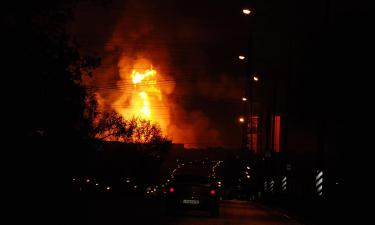Russian Oligarchs Irresponsible
Russian oligarchs publicly say they won't discuss Russia's problems that arise as a result of their business activity; what is more, they hamper foreign investments
Russian oligarchs publicly say they won't discuss Russia's problems that arise as a result of their business activity; what is more, they hamper foreign investments
The scandal about Menatep and Yukos gave rise to a hail of indignation among mass media related to business structures. Journalists sarcastically say here and there that representatives of the authority act unwise. However, such mass media mostly give witty comments only to the outward part of the scandal. It seems that journalists won't try to understand the reason why the authorities follow this very policy in the situation.
This doesn't sound convincing when mass media say that the authorities initiated the scandal about Yukos and Menatep with a view of seizing the assets. On the contrary, if the authorities had this objective in mind, they wouldn't kick up a row. If the property passes to the budget, the authorities would have used an administrative resource to lobby a commercial structure closely related to the authorities. But in fact the situation is quite different.
The problem is as follows. In a normal liberal society oligarchs acts as the driving force in development of the economic infrastructure of their countries simultaneously strengthening their material well-being and creating a favorable business climate. At the same time, they develop a civilized political climate in the country. But in this country the situation is radically different. Russian oligarchs publicly declare that they won't consider problems arising in adjacent economic sectors as a result of their business activity. It seems that they also don't care about perspective problems of their business because Russian oligarchs don't invest in renewal of their basic assets. The situation in Russia resembles the newly built elite settlements around big cities where expensive tasteless and pretentious "castles" tower above dilapidated shacks.
The position of representatives of the governmental authority in the structure of the society makes them understand their responsibility and dependency upon the condition of national problems. That is why they make efforts to settle these problems, and sometimes do it rather clumsy. There is no other force that at least imitates it performs this function. Under these conditions it would be wiser not to be sarcastic with respect to the authorities but advise them how to be more effective (if certainly sarcastic journalists know it can be made).
There is no need to get disappointed with the fact that Russia's investment attractiveness is declining. In fact, the situation will scare away only investors who aim at momentary profits only and don’t care about other problems of Russia. Investments of this kind only aggravate the structural crisis in the Russian economy, because circulation of this money forms an industrial desert. On the contrary, civilized western investors are anxious about the theory and practice of primary accumulation in Russia and consequences that they may bring to the economy of the country. Only the system of primary accumulation in Russia restrains civilized investors. As the same time, this situation is favorable for Russian oligarchs as they want to be the only mediators between Russia's resources and capital coming from the West.
Attempts of the government to liquidate the established rules of play (these are the charges brought against Platon Lebedev in the framework of the Yukos scandal) may help Russia strengthen its positive image among influential investors. If certainly Russia manages to carry the function through.
Alexander Artyomov
Candidate of Technical Science
Special to PRAVDA.Ru
Subscribe to Pravda.Ru Telegram channel, Facebook, RSS!



